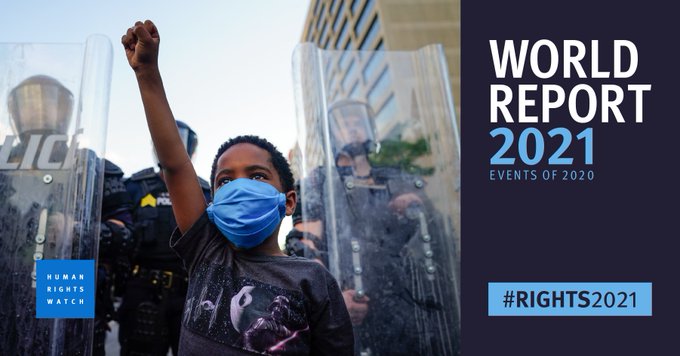
In their year-end report, Human Rights Watch detailed how the Rajapaksa regime has placed fundamental rights under “serious jeopardy” with “escalated surveillance and intimidation targeting victims’ families and human rights defenders”.
Sri Lanka’s Foreign Ministry has decried the report claiming that the report was “exaggerated and unduly negative”. He further warned that the “sensationalized and biased reporting” risks “risks igniting and aggravating domestic discord”. The statement also condemned the evidence gathering mechanism contained in the latest UN Human Rights Council resolution alleging that it would lead to politicization and polarization in Sri Lanka.
Attacks on human rights defenders
In their report HRW details that victims and activists who engaged with the Human Rights Council have been targeted by Sri Lanka security forces.
This includes Tamil families of the disappeared who have been campaigning for years to know the fate of their loved ones who were last seen with Sri Lanka security forces. The report details the surveillance and threats they faced from Sri Lankan agents including intimidating phone calls. Sri Lankan authorities have demanded to know the personal details of staff working with human rights defenders and have inquired into their work on accountability for past atrocities.
HRW also notes the targeting of funding for human rights groups under the pretence that such finance was used to support terrorism. In addition to this, the Rajapaksa administration placed the nongovernmental organisation secretariat under the authority of Sri Lanka’s Defence ministry. The government have also proposed a new law to regulate foreign funding which risks stifling freedom of expression and association.
In March the government issued a wide-reaching proscription on hundreds of Tamil and Muslim individuals and organisations.
The report also highlights that Kumaravadivel Guruparan, a lawyer representing the families of victims of enforced disappearance, was prevented from teaching law at Jaffna University following an intervention by the army.
They also detail the continued detention of Muslim lawyer Hejaaz Hizbullah under Sri Lanka’s draconian Prevention of Terrorism Act. The report also notes that Nishantha Silva, a senior police investigator investigating crimes committed under the previous Rajapaksa administration, was forced to flee after Gotabaya Rajapaksa was elected.
In July 2021, the former head of the Criminal Investigation Department, Shani Abeysekera, who oversaw cases Silva was previously engaged in was arrested for allegedly concealing evidence. This is despite a police officer testifying that he was pressured to falsely incriminate Abesysekera who remains in detention.
Militarisation and institutional changes
The HRW further slams to the increasing militarisation of Sri Lanka noting that the government placed over 30 agencies, including the police, under the authority of the Ministry of Defence. The government further appointed several military officials accused of war crimes to head positions previously held by civilians.
The report further criticised the President’s Task Force to create “a Secure Country, Disciplined, Virtuous and Lawful Society, composed entirely of military and security officials, with loosely defined powers and the authority to issue instructions to all government officials”.
Power has further been centralised within the power of the presidency with the passage of the 20th amendment which provides sweeping powers. These include “to appoint senior judges, members of the Human Rights Commission and other independent institutions, such as anti-corruption bodies, to appoint and dismiss ministers including the prime minister, and to dissolve parliament at least two and a half years after elections”.
Accountability and justice
Detailing Sri Lanka’s failure to tackle ongoing issues of accountability, the report highlights the pardoning of convicted war criminal Sunil Ratnayake who was convicted of killing 8 Tamil civilians, including children, at Mirusuvil in 2000.
The report further highlights the call of families of the disappeared who called on the UNHRC to adopt a new international accountability mechanism to pursue justice for abuses.
Freedom of expression
The HRW report details the death threats and intimidation journalists in Sri Lanka faces and highlighted the cases of Dharisha Bastians and Ramzy Razeek.
Reporters Without Borders (RSF) has highlighted that since Sri Lankan president Gotabaya Rajapaksa took office in 2019, "there was a surge in cases of police harassment of journalists, including raids, interrogations and acts of intimidation, for all sorts of reasons." "The issue of impunity for crimes of violence against journalists continues to dog the press freedom situation on the island," it continued.
Mullaitivu Press Club has condemned the ongoing harassment of Tamil journalists and the brutal assault of journalist Viswalingham Viswachandran. In a statement they highlighted the abduction and forced disappearance of 44 Tamils journalists and lack of accountability. Last month Batticaloa journalists assembled en-mass to demand that Sri Lanka respect press freedom.
Sri Lanka is currently ranked 127th out of 180 countries in RSF's World Press Freedom Index.
Religious persecution
Commenting on the ongoing religious persecution on the island the report details how the discrimination against Muslims noting the widely-condemned policy of forced cremations and how social media platforms has enabled for the circulation of malicious islamophobic rumours.
HRW also takes aim at the President’s Task Force for Archeological Heritage Management in the Eastern Province, composed of security officials and Buddhist monks. This, the report notes, raises fears that it would disadvantage the predominant Tamil and Muslim communities.
Sexual discrimination and gender-based violence
HRW also criticised the ongoing discrimination of LGBT individuals and highlighted a “law banning ‘impersonation’ [which] is used to target transgender people. Authorities use these powers to harass, detain, and extort gay, lesbian and transgender people, who also face societal discrimination”.
Commenting on women’s rights, the report details the spike in gender-based violence with a significant loss of wages for women working the garment factories.
Read the full report here.
